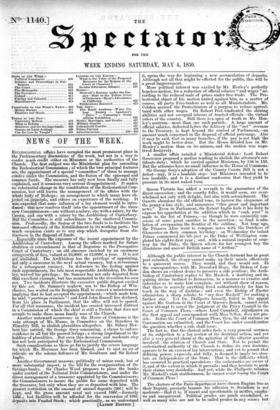Although the public interest in the Church ferment has in
great part subsided, the clergycannot make up their minds effectively to a quieseent course. They would,- and they would not. • In the correspondence with Mr. Beresford Hope, the Bishop of Lon- don shows an evident desire to preserve a safe position ; the Arch- bishop of Canterbury replies to Mr. Maskell, a doubting and in- quiring divine inclined to Romanism, in a manner so evasive and indecisive as to make him complain, not withodt show of reason, that there is scarcely anything fixed authoritatively for him to teach in the way of doctrine ; and even the Bishop of Exeter, administers a sharp rebuke to "my dear Maskell " for making a: further stir. Yet Dr. Phillpotts himself, foiled in his appeal- against Mr. Gorham in the Court of Queen's Bench, cannot resist a new attempt to arrest the judgment of the Privy Council in the Court of . Common Pleas,—where Lord Campbell, adjudipctor on the first appeal and correspondent with Miss Sellon, does not pre-_ side. Before the Court of Common Pleas, then, the old statutes on' Convocation are submitted, and the Court has under consideration the question whether a rule shall issue. The fact is, that the clerical order feels a very general soreness at its subjection to a lay review of its doctrinal action, and yet also a very general alarm at the agitation of the ulterior question involved—the relation of Church and State. Not to permit the ecclesiastical authority of the Church to define its own doctrine, appears to be an excess of lay intervention ; and yet to permit that defining .power, expressly and fully, is deemed to imply too abso- lute an independence of the State. That is the difficulty which has occurred to practical speculators: the ecclesiastics are aware of it, and of the extent to which it prevails ; and they hesitate to push their claims very decidedly. And yet, while Dr. Phillpotts rebukes Mr. Maskell's rash stubbornness, he cannot resist trying the Court of Common Pleas !
























